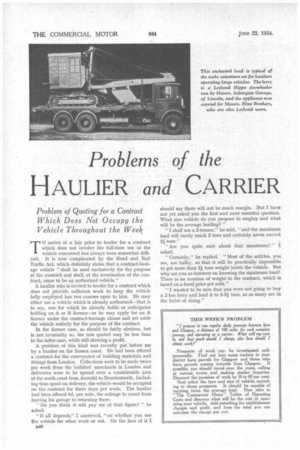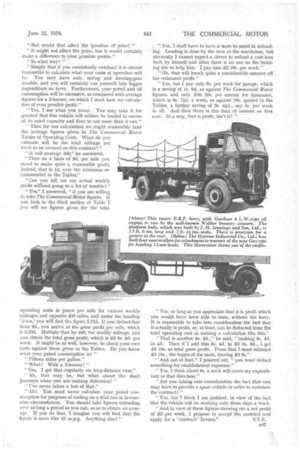Problems of the
Page 60

Page 61

If you've noticed an error in this article please click here to report it so we can fix it.
HAULIER and CARRIER
Problem of Quoting for a Contract Which Does Not Occupy the Vehicle Throughout the Week
T0 arrive at a fair price to tender for a contract which does not involve the full-time use of the vehicle concerned has always been somewhat difficult. It is now complicated by the Road and Rail Traffic Act, which definitely states that a contract-haulage vehicle "shall be used exclusively for the purpose of the contract and shall, at the termination of the contract, cease to be an authorized vehicle."
A haulier who is invited to tender for a contract which does not provide sufficient work to keep the vehicle fully employed has two courses open to him. He may either use a vehicle which is already authorized—that is to say, one for which he already holds or anticipates holding an A or B licence—or he may apply for an A licence under the contract-tonnage clause and set aside the vehicle entirely for the purpose of the contract.
In the former case, as should be fairly obvious, but is not invariably so, the rate quoted may be less than in the latter case, while still showing a profit.
A problem of this kind was recently put before me by a haulier on the Sussex coast. He had been offered a contract for the conveyance of building materials and fittings from London. Collections were to be made twice per week from the builders' merchants in London and deliveries were to be spread over a considerable area of the south coast from Arundel to Bournemouth. Including time spent on delivery, the vehicle would be occupied on the contract for three days per week. The haulier had been offered 9d. per mile, the mileage to count from leaving his garage to returning there.
"Do you think it will pay me at that figure?" he asked.
" It all depends," I answered, "on whether you use the vehicle for other work or not. On the face of it I B46 should say there will not be much margin. But I have not yet asked you the first and most essential question. What size vehicle do you propose to employ and what will be the average loading?"
"I shall use a 2-tonner," he said, "and the maximum load will rarely reach 2 tons and certainly never exceed 21 tons."
"Are you quite sure about that maximum?" I asked.
"Certainly," he replied. "Most of the articles, you see, are bulky, so that it will be practically impossible to get more than 2i tons weight inside the vehicle. But why are you so insistent on knowing the maximum load? There is no mention of weight in the contract, which is based on a fixed price per mile."
"I wanted to be sure that you were not going to buy a 2-ton lorry and load it to 3-3i tons, as so many are in the habit of doing."
" But would that affect the question of price? "
" It might not affect the price, but it would certainly make a difference to your possible profits."
"In what way? "
" Simply that if you consistently overload it is almost impossible to calculate what your costs of operation will be. You may have axle, spring and steering-gear trouble, and you will certainly run yourself into bigger expenditure on tyres. Furthermore, your petrol and oil consumption will be excessive, as compared with average figures for a 2-tonner, on which I must base my calculation of your possible profit."
"Yes, I see what you mean. You may take it for granted that this vehicle will seldom be loaded in excess of its rated capacity and then to not more than 5 cwt."
" Then for our calculation we might reasonably take the average figures given in The Commercial Motor Tables of Operating Costs. What do you estimate will be the total mileage per week to be covered on this contract?"
"It will average 400," he answered.
"Then on a basis of 9d. per mile you stand to make quite a reasonable profit. Indeed, that is d. over the minimum recommended in the Tables."
"Can you tell me my actual weekly profit without going to a lot of trouble?
"Yes," I answered, "if you are willing to take The Commercial Motor figures. If you look in the third section of Table you will see figures given for the total operating costs in pence per mile for various weekly mileages and opposite 400 miles, and under the heading 2-ton,' you will find the figure 5.71d. If you deduct that from Pd., you arrive at the gross profit per mile, which is 3.29d. Multiply that by 400, the weekly mileage, and you obtain the total gross profit, which is £5 9s. 8d. per week. It might be as well, however, to check your own costs against those given in the Tables. Do you know what your petrol consumption is?"
" Fifteen miles per gallon."
" What I With a 2-tanner? "
"Yes. I get that regularly on long-distance runs." " Ah, that may be, but what about the short journeys when you are making deliveries? "
"I've never taken a test of that."
" Ah I You must never calculate your petrol consumption for purposes of costing on a trial run in favourable circumstances. You should take figures extending over as long a period as you can, sons to obtain an average. If you do that, I imagine you will find that the figure is more like 13 m.p.g. Anything else?" "Yes, I shall have to have -a mate to a.ssist in unloading. Loading is done by the men at the warehouse, but obviously I cannot expect a driver to unload a cast-iron bath by himself and often there is no one on the building site to help him. I pay him £2 10s. per week."
"Oh, that will knock quite a considerable amount off the estimated profit."
"Yes, but I pay only 6s. per week for garage, which is a saving of is. 6d. as against The Commercial Motor figures, and only. £16 10s. per annum for insurance, which is 6s. 7-id. a week, as against 10s. quoted in the Tables, a further saving of 3s. 44c1., say 5s. per week in all. And then there is this item of interest on first cost. In a way, that is profit, isn't it? "
"Yes, so long as you appreciate that it is profit which you would have been able to earn, without the lorry. It is reasonable to take into consideration the fact that it actually is profit, or, at least, can be deducted from the total operating cost in making a calculation like this."
"That is another 4s. 4d.," he said, "making 9s. 4d. in all. Then if I add this 9s. 4d. to £5 9s. 8d., I get £5 19s. as total gross profit. From that I must subtract £2 10s., the wages of the mate, leaving £3 9s."
"And out of that," I pointed out, "you must deduct something for establishment expenses."
"Yes, I think about 9s. a week will cover my expenditure in that direction."
"Are you taking into consideration the fact that you may have to provide a spare vehicle in order to maintain the contract? "
"Yes, but I think I am justified, in view of the fact that the vehicle will be working only three days a week.
"And in view of these figures showing me a net profit of £3 per week, I propose to accept the contract and apply for a 'contract' licence." S.T.R.




























































































